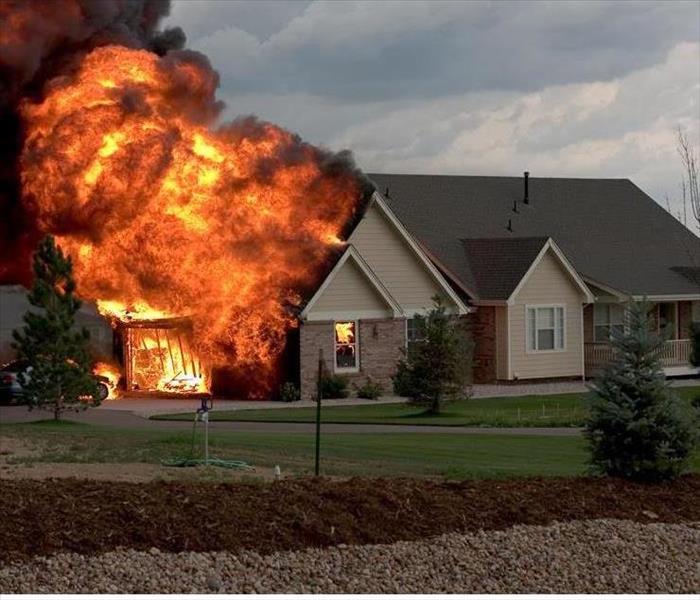Common Causes of Household Fires
6/15/2018 (Permalink)
A fire in the home can spread much more quickly than you might expect. Even a small fire can completely engulf a room in just two minutes.
The loss caused by fire damage is vast and irreversible, so it’s worth making yourself aware of the most common causes of fires in the home to reduce the risk of a devastating fire.
Candles
Candles can add a beautiful atmosphere or scent to any room, but improper use can easily cause a fire.
Never leave a candle burning unattended. Keep wicks trimmed to avoid large flames. Ensure that candles are placed on a heat-proof surface well away from walls, curtains or lampshades. Don’t place a candle in a draught as this may blow the flame towards something flammable. Lighters and matches should be kept somewhere safe and out of the reach of children.
Cooking
There are many hazards in the kitchen when it comes to fire. Cooking oil in particular is very dangerous, as it can get incredibly hot and splatter on flammable surfaces.
Never leave the hob or oven unattended while in use, even if it’s just for a minute. If you have a gas hob or oven, always make sure to keep items such as oven gloves or paper towels away from the open flame, and make sure to switch them off after use. Only use as much oil as necessary while cooking and cover frying pans with lids or splatter guards.
Smoking
Hot ash, embers, and cigarettes that have not been properly stubbed out are all capable of starting a fire, particularly in rooms that are full of soft furnishings such as beds, sofas and carpets.
It is safer to smoke outside where a fire is less likely to take hold, but be aware of your surroundings and don’t smoke around flammable substances such as petrol. Always make sure that cigarettes are properly extinguished. Keep lighters and matches away from children.
Electrical equipment
While electrical items that generate heat such as curling tongs are more obvious fire hazards, anything that uses electricity could cause a fire if it is faulty.
Regularly inspect the cables on your electrical items for signs of damage. Never overload plug sockets with multiple adapters. If an item that you are using starts to smoke or feel very hot, stop using it immediately and unplug it. If an item frequently blows fuses or trips the circuit breaker, it is likely faulty and therefore unsafe.
Faulty wiring
Electrical currents carry heat, so wiring can lead to a fire if it is faulty or overloaded. Electrical systems typically have a lifespan of around 40 years, so older houses may need to be rewired.
Common signs that your wiring may be faulty include frequent blown fuses or tripped circuits, lights that dim if you use another appliance, or having to unplug one appliance for another to work. If you’re concerned about the safety of your wiring, get it inspected by a licensed electrician.
Heating
Well maintained heating appliances that are used according to the manufacturer’s guidelines shouldn’t cause a problem, but you must always make sure to look after your appliances.
Get your boiler inspected regularly by a licensed professional to check for and repair any problems. Any electric heaters must be placed at least a metre away from other objects, especially flammable items such as curtains and sofas. Never cover an electric heater or use them to dry wet clothes.
Children
Children can be curious and clumsy, making them a potential liability when it comes to fire.
Always keep matches and lighters out of sight and reach of children, and be sure to warn them of the dangers of playing with fire. Never leave children unattended around naked flames such as candles or gas hobs. Be mindful of any children present while cooking or using open flames.
If you’ve been the victim of a fire in your home, get in touch with SERVPRO of North Rowan County & Salisbury





 24/7 Emergency Service
24/7 Emergency Service
